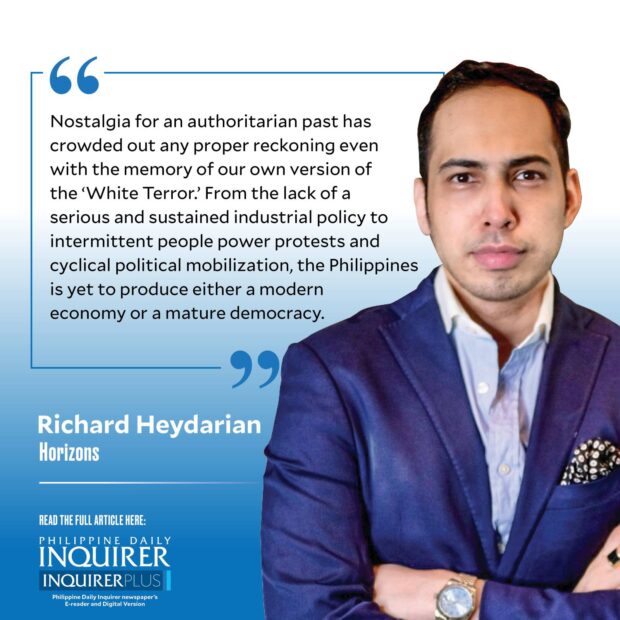Philippines: A feudal democracy?
 Taipei—“Democracy is not free,” exclaimed the speaker, our guide during a visit to the Cheng Nan-jung Liberty Museum. Tucked in a nondescript part of Taiwan’s capital, the museum was built on the actual site where one of the country’s democracy activists, Cheng Nan-jung, was martyred through an act of self-immolation in defense of freedom of speech. His tragic demise came in the twilight years of the Kuomintang (KMT) dictatorship, which dominated the self-ruling island nation throughout the Cold War period.
Taipei—“Democracy is not free,” exclaimed the speaker, our guide during a visit to the Cheng Nan-jung Liberty Museum. Tucked in a nondescript part of Taiwan’s capital, the museum was built on the actual site where one of the country’s democracy activists, Cheng Nan-jung, was martyred through an act of self-immolation in defense of freedom of speech. His tragic demise came in the twilight years of the Kuomintang (KMT) dictatorship, which dominated the self-ruling island nation throughout the Cold War period.
Dubbed by the Portuguese as the island of “Formosa” (beautiful) at the dawn of modernity, Taiwan paid a heavy price for the denouement of the vicious civil war in Mainland China. Shortly after retreating to the island nation after suffering defeat at the hands of communist forces, Chiang Kai-shek and his henchman established a distinctly brutal authoritarian regime.
Faced with resistance from the indigenous population, which resented the overlordship of newly arrived mainlanders, KMT responded with wanton violence. In 1947, the regime confronted a nationwide revolt by massacring between 18,000 and 28,000 people, according to the New York Times. What followed was decades of systematic repression known as the “White Terror.”
“So many ridiculous and cruel things happened in Taiwan during those days,” lamented Fred Chin Hi San, our guide during a visit to the National Human Rights Museum. A Malaysian by birth, he ended up spending more than a decade in jail under the KMT dictatorship based on trumped-up charges.
Wrestling with his memories, he patiently guided us through the very infrastructure—from the courtroom to the dungeons—that snatched away his halcyon years. “Put human rights first,” he advised, underscoring the importance of human life and dignity above all else. Although his interrogators couldn’t pin down a single incriminating evidence against him, they ended up imprisoning him simply because “they could not lose face.” Authoritarian regimes often speak of law and order, and obsess over “national security,” yet they snuff away countless lives on the most preposterous grounds.
Until this day, “transitional justice” is a major sticking point in Taiwanese politics. Victims and activists have been aghast at how the KMT—now, paradoxically, a Beijing-friendly clique—is still a major political force despite its failure to fully account for its brutal past. Taiwan is a nation haunted as much by its past as by the specter of a potential Chinese invasion in the near future.
And yet, it’s incredible how far the country has come since its first democratic elections barely three decades ago. According to the Economist Intelligence Unit, Taiwan is Asia’s most democratic nation, a lofty ranking that can be triangulated by all other major indices.
Taiwan boasts one of the highest per capita incomes, one of the best health-care systems, and is among the top 30 happiest populations on earth in terms of objective living standards. Home to world-class small and medium enterprises, which export to all major markets, the tiny island nation is also responsible for the production of more than 90 percent of high-end semiconductors—the mitochondria of all modern gadgets.
And this, dear reader, brings us back to our beloved nation. Perched barely an hour by flight from Taiwan, the Philippines transitioned to democracy years ahead. And yet, both our political and economic systems seem centuries apart from that of Taiwan’s.
Malacañang has been passed down from one dynasty to the other in recent decades. Our legislature, where political dynasties have dominated close to 80 percent of seats, is even more of a family affair. As for our economy, a tiny group of oligarchs has failed to produce a single world-class manufacturing brand despite dominating the country’s real estate, retail, media, and banking sectors. Usurpingly, the Philippines has one of the highest poverty, inequality, and crime rates in Asia.
Meanwhile, nostalgia for an authoritarian past has crowded out any proper reckoning even with the memory of our own version of the “White Terror.” From the lack of a serious and sustained industrial policy to intermittent people power protests and cyclical political mobilization, the Philippines is yet to produce either a modern economy or a mature democracy.
Complacency has been the bane of this nation, for neither freedom nor sustained development comes for free. The Philippines will perpetually remain a feudal democracy unless we get our act together.
—————-




















